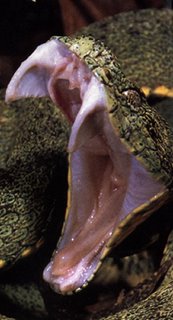Snake Bites

We normally see several snake bites each year, however not in the winter but I saw one this week. There are plenty of snakes here in North Florida and with the rain and warm weather we have had
we saw a snake bite this week. I thought it would be prudent to go over the signs you could see and some complications associated with them. Usually the bite wound is on the nose or face since they are frequently bitten while grazing. You will find localized swelling and a bloody drainage from the bite wounds and sometimes the nostrils. The good news is that not all snake bites envenomate,
(about 25% of Rattlesnake bites don't envenomate) but even if they don't, there is frequently a severe infection since their mouths contain Pseudomonas, Klebsiella and E.Coli. The toxins in snake venom are very complex and cause either hemolysis and coagulopathies or neurologic damage. There is pain and difficulty drinking and swallowing as the swelling progresses and if unchecked the swelling can restrict the airway. If you suspect a snake bite you should contact your Veterinarian so they can institute treatment. Do not try to cut and suction the venom as this doesnt work and may actually speed up absorption. Do not use a tourniquet.....since it is usually a bite above the neck....well, I hope this is self evident.
The unusual complication we experienced this week was the development of colic 48 hours later. After treating the horse with anti-inflammatories and antibiotics the swelling was receding but signs of abdominal pain developed. In this case a coagulopathy had occured and a clot/thrombus had formed in one of the blood vessels supplying the small intestine causing the bowel to die. This was found during exploratory surgery.
While you shouldn't have to deal with snake bites until the spring it is always good to be aware if your horse is in an area where snakes could be....pretty much anywhere in Florida.

Comments